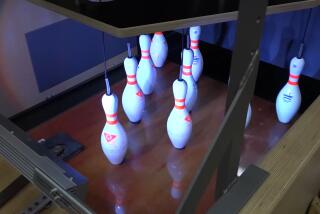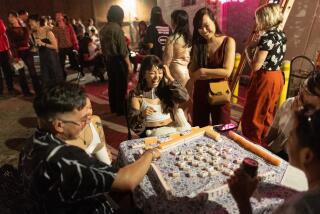Nobody Can Breeze Through This Event
- Share via
ATLANTA — Pingpong, the game Forrest Gump helped make famous, is played by more than 60 million in China. Here, at the Centennial Olympic Games, it is called table tennis and has crowds cheering the bouncing 1 1/2-inch orange celluloid ball.
Merely getting in to watch is a challenge. On the doors outside Hall D at the World Congress Center are signs that read: “Please observe this is an air-lock door.” Only a small number of people at a time are allowed through the first set of doors. After waiting in a holding area until all the doors are closed behind them, they are admitted through a second set of doors.
Not the slightest waft of air is allowed into the hall to disturb balls that weigh only 2.5 grams.
During qualifying rounds, there are eight tables, with bright purple tops. Each table, partitioned from the next by low green curtains, is flanked by four officials. While waiting for games to begin, they test the air by tossing a ball over the tables.
“Ladies and Gentlemen, please welcome the world’s greatest table tennis players!” shouts the announcer, as the athletes march into the hall.
As the women’s singles qualifying round round began Friday, the top four players in the world were among the 16 competitors. They were scattered at tables across the hall.
At Table 2, Amy Feng, 27, of Wheaton, Md., battled the world’s No. 4 woman, Liu Wei, 26, of China. Feng won the first game before falling, 16-21, 21-8, 21-15.
Feng and Liu were born in China. Feng immigrated to the U.S. in 1992 after failing to be picked for the Chinese 1992 World Championships team. A decade ago, she was China’s third-best singles player.
The third set between Feng and Liu created high energy in the crowd. The other players had completed their games and now Liu and Feng were the only players in the hall. Feng’s every point was met with shouts of “USA, USA.” Some of the Chinese spectators shouted “Quiet, Quiet.” The players waited for the roar to dissolve before serving.
Feng lost her chance to advance to the finals, with little left but to sum up the match.
“What I thought was she would have some special move,” Feng said. “I would have to attack before she does that. But she played real soft. I played too hard. I tried too hard.”
In the same qualifying round, Yaping Deng, of China, the gold medalist in women’s singles in Barcelona in 1992, defeated Sweden’s Marie Svensson, 21-14, 21-4.
More to Read
Go beyond the scoreboard
Get the latest on L.A.'s teams in the daily Sports Report newsletter.
You may occasionally receive promotional content from the Los Angeles Times.






